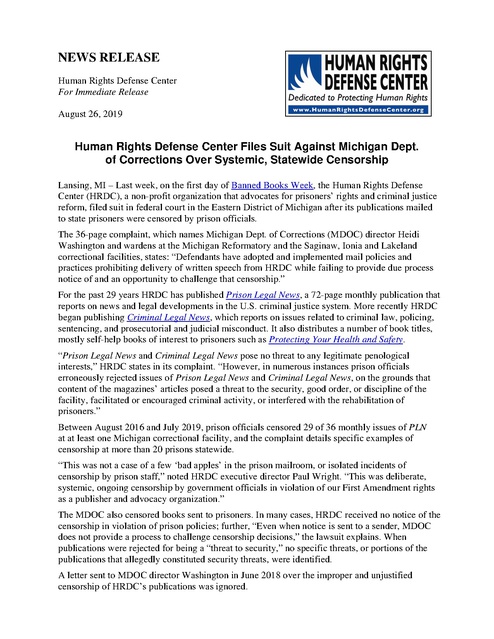HRDC files censorship suit against Michigan DOC
NEWS RELEASE
Human Rights Defense Center
For Immediate Release
August 26, 2019
Human Rights Defense Center Files Suit Against Michigan Dept. of Corrections Over Systemic, Statewide Censorship
Lansing, MI – Last week, the Human Rights Defense Center (HRDC), a non-profit organization that advocates for prisoners’ rights and criminal justice reform, filed suit in federal court in the Eastern District of Michigan after its publications mailed to state prisoners were censored by prison officials.
The 36-page complaint, which names Michigan Dept. of Corrections (MDOC) director Heidi Washington and wardens at the Michigan Reformatory and the Saginaw, Ionia and Lakeland correctional facilities, states: “Defendants have adopted and implemented mail policies and practices prohibiting delivery of written speech from HRDC while failing to provide due process notice of and an opportunity to challenge that censorship.”
For the past 29 years HRDC has published Prison Legal News, a 72-page monthly publication that reports on news and legal developments in the U.S. criminal justice system. More recently HRDC began publishing Criminal Legal News, which reports on issues related to criminal law, policing, sentencing, and prosecutorial and judicial misconduct. It also distributes a number of book titles, mostly self-help books of interest to prisoners such as Protecting Your Health and Safety.
“Prison Legal News and Criminal Legal News pose no threat to any legitimate penological interests,” HRDC states in its complaint. “However, in numerous instances prison officials erroneously rejected issues of Prison Legal News and Criminal Legal News, on the grounds that content of the magazines’ articles posed a threat to the security, good order, or discipline of the facility, facilitated or encouraged criminal activity, or interfered with the rehabilitation of prisoners.”
Between August 2016 and July 2019, prison officials censored 29 of 36 monthly issues of PLN at at least one Michigan correctional facility, and the complaint details specific examples of censorship at more than 20 prisons statewide.
“This was not a case of a few ‘bad apples’ in the prison mailroom, or isolated incidents of censorship by prison staff,” noted HRDC executive director Paul Wright. “This was deliberate, systemic, ongoing censorship by government officials in violation of our First Amendment rights as a publisher and advocacy organization.”
The MDOC also censored books sent to prisoners. In many cases, HRDC received no notice of the censorship in violation of prison policies; further, “Even when notice is sent to a sender, MDOC does not provide a process to challenge censorship decisions,” the lawsuit explains. When publications were rejected for being a “threat to security,” no specific threats, or portions of the publications that allegedly constituted security threats, were identified.
A letter sent to MDOC director Washington in June 2018 over the improper and unjustified censorship of HRDC’s publications was ignored.
“In adopting and implementing the above censorship policies and practices, Defendants have knowingly violated, continue to violate, and are reasonably expected to violate in the future, HRDC’s constitutional rights,” the lawsuit states.
“HRDC’s magazines and books educate prisoners about their constitutional rights,” noted HRDC general counsel and litigation project director Sabarish Neelakanta. “Banning such protected speech from reaching this vulnerable population is an affront to the First Amendment and contrary to well-established constitutional principles afforded to publishers seeking to communicate with prisoners.”
In addition to its complaint HRDC filed a motion for a preliminary injunction, asking the federal district court to enjoin the defendants from “(1) censoring written materials mailed by HRDC to prisoners in Defendants’ prisons and (2) denying HRDC notice and an opportunity to challenge any such censorship decisions.”
HRDC is raising claims under the First and Fourteenth Amendments, and seeks declaratory and injunctive relief; compensatory, punitive and nominal damages; and attorneys’ fees and costs.
The organization is represented pro bono by attorneys James E. Stewart, Andrew M. Pauwels and Rian C. Dawson with the Detroit law firm of Honigman, LLP; by Dan Manville, director of the Civil Rights Clinic at the Michigan State University College of Law; and by HRDC general counsel Sabarish Neelakanta and staff attorneys Dan Marshall and Masimba Mutamba.
The case is Human Rights Defense Center v. Winn,U.S.D.C. (E.D. Mich.), Case No. 2:19-cv-12470. The complaint is posted here.
____________________
The Human Rights Defense Center, founded in 1990 and based in Lake Worth, Florida, is a non-profit organization dedicated to protecting human rights in U.S. detention facilities. In addition to advocating on behalf of prisoners and publishing books and magazines related to the criminal justice system, HRDC engages in state and federal court litigation on prisoners’ rights issues, including wrongful death, public records, class actions and Section 1983 civil rights cases.
For further information, please contact:
Sabarish Neelakanta, General Counsel
Human Rights Defense Center
(561) 360-2523
sneelakanta@humanrightsdefensecenter.org
Paul Wright, Executive Director
Human Rights Defense Center
(561) 360-2523
Alex Friedmann, Associate Director
Human Rights Defense Center
(615) 495-6568
afriedmann@prisonlegalnews.org







